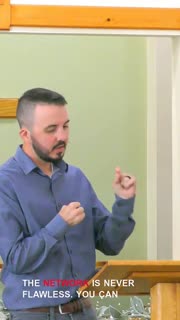Faithfulness in the Church: A Network of Believers
Devotional
Sermon Summary
Bible Study Guide
Sermon Clips
1. "Because when we didn't read this in just a moment, it comes to mind the fact that really Paul shows us that the church, the church is not just a weekly pit stop for believers to learn a little bit about Jesus and then live Jesus Monday through Saturday. But instead, the church, the ministry of the gospel, the great commission, everything about Christ that Christ left after us is a network of believers. Not a pit stop for us to stop and get a little rest, but it's a network of believers." [03:36] (32 seconds)
2. "The network is never flawless. You can look at this design that God had created for the last 2000 years called the church. And the church has never in a single day of her life been flawless. She has problems. This network of believers that you and I are a part of, we have never been flawless. She's not perfect. She's not. Ever going to be perfect. So long as we're left here on this earth, how do I know that? Because the first Christians that came after Paul were not perfect." [07:30] (39 seconds)
3. "Demas represents the fair weather disciples and followers of Christ. When the tallest doesn't demand much, they will do their part, of course. But when it starts to become costly, the Demases are nowhere to be found, for they will always love this present world more than the world to come. Having loved this present, the attractions of Rome, the attractions of the Roman Empire was far more attractive to Demas in the kingdom of Christ." [17:26] (41 seconds)
4. "Luke was a devoted disciple. He was a devoted asset to the ministry, to the church, to Paul. And then, of course, you have one of the other devoted ones that have been with Paul from the beginning, Mark. You think, what's so cool about Mark? What's so great about Mark? I mean, if Luke is up here, never done wrong, church historian, great physician, just a learned man through and through that Paul depended on so often. In fact, many scholars say Paul probably helped Paul. Luke probably helped Paul write some of his letters. Mark was an altogether different breed. Mark failed Paul." [23:26] (43 seconds)
5. "Titicus was the consistent deliverer for Paul. How do we know that? Titicus is perhaps one of the only messengers who sent Paul's letters. We find that Titicus went to Ephesus, he sent to Ephesus, he sent very well this second letter to Timothy to Ephesus with him in his hand. And what's amazing about Titicus still is that he is well documented in his consistencies to one specific ministry. It wasn't preaching. It wasn't church planting. He wasn't the greatest soul winner that Paul had. He didn't have a series of people that he led to the Lord. He had one specific ministry that it was valued above all else, delivery." [29:49] (45 seconds)
6. "The Lord is faithful. The Lord stood with me and strengthened me so that the message might be preached fully through me and that all the Gentiles might hear and also I was delivered out of the mouth of the line. We find that the Lord will always be found faithful. The network is faithful by Christ. Though the network is never flawless, the network is faithful by Christ. The Lord will always be found faithful when no one else can." [45:44] (27 seconds)
7. "Paul did not need to depend on anybody else. Paul's ministry and the effectiveness of ministry was not in a spiritual sense dependent on the success or the failure of somebody else. It is the Lord's mission. It is the Lord's church. He will build it. He will do what he wants with it. Paul just said, I was able to faithfully and fully preach the message. He was preserved by the Lord to be used by the Lord. Paul was an instrument for the gospel to go through." [47:14] (28 seconds)
8. "The network is not finished. You're here, you're in church. If we believe what we believe to be right, the church will only get raptured when the work of the grace and the work of the church is done. So for every Lord's Day we get to be here, it's another reminder that we still have work to do. The network is not done. It's still not complete." [48:15] (22 seconds)
9. "Paul in his last and final words showed the great, ordinate beauty that the network of this universal church is comprised of. I love how I have a few commentaries and one of them is old Johnny Mac McArthur. He notes this about this passage of scripture with all these people. He says the network includes both men and women, close friends and avowed enemies, the faithful and the deserter, the true believer and the unbelievers." [50:49] (34 seconds)
10. "The challenge for you and I today is to see if we are still yet when we leave from this place today, will we leave in faithfulness to the Lord's network or as failures to that which he has called and equipped us to. Yet we have chosen to resist and desert the church when she is in her greatest need of us. I hope that's not you. I pray that's not you." [51:21] (26 seconds)
Ask a question about this sermon
2. "The network is never flawless. You can look at this design that God had created for the last 2000 years called the church. And the church has never in a single day of her life been flawless. She has problems. This network of believers that you and I are a part of, we have never been flawless. She's not perfect. She's not. Ever going to be perfect. So long as we're left here on this earth, how do I know that? Because the first Christians that came after Paul were not perfect." [07:30] (39 seconds)
3. "Demas represents the fair weather disciples and followers of Christ. When the tallest doesn't demand much, they will do their part, of course. But when it starts to become costly, the Demases are nowhere to be found, for they will always love this present world more than the world to come. Having loved this present, the attractions of Rome, the attractions of the Roman Empire was far more attractive to Demas in the kingdom of Christ." [17:26] (41 seconds)
4. "Luke was a devoted disciple. He was a devoted asset to the ministry, to the church, to Paul. And then, of course, you have one of the other devoted ones that have been with Paul from the beginning, Mark. You think, what's so cool about Mark? What's so great about Mark? I mean, if Luke is up here, never done wrong, church historian, great physician, just a learned man through and through that Paul depended on so often. In fact, many scholars say Paul probably helped Paul. Luke probably helped Paul write some of his letters. Mark was an altogether different breed. Mark failed Paul." [23:26] (43 seconds)
5. "Titicus was the consistent deliverer for Paul. How do we know that? Titicus is perhaps one of the only messengers who sent Paul's letters. We find that Titicus went to Ephesus, he sent to Ephesus, he sent very well this second letter to Timothy to Ephesus with him in his hand. And what's amazing about Titicus still is that he is well documented in his consistencies to one specific ministry. It wasn't preaching. It wasn't church planting. He wasn't the greatest soul winner that Paul had. He didn't have a series of people that he led to the Lord. He had one specific ministry that it was valued above all else, delivery." [29:49] (45 seconds)
6. "The Lord is faithful. The Lord stood with me and strengthened me so that the message might be preached fully through me and that all the Gentiles might hear and also I was delivered out of the mouth of the line. We find that the Lord will always be found faithful. The network is faithful by Christ. Though the network is never flawless, the network is faithful by Christ. The Lord will always be found faithful when no one else can." [45:44] (27 seconds)
7. "Paul did not need to depend on anybody else. Paul's ministry and the effectiveness of ministry was not in a spiritual sense dependent on the success or the failure of somebody else. It is the Lord's mission. It is the Lord's church. He will build it. He will do what he wants with it. Paul just said, I was able to faithfully and fully preach the message. He was preserved by the Lord to be used by the Lord. Paul was an instrument for the gospel to go through." [47:14] (28 seconds)
8. "The network is not finished. You're here, you're in church. If we believe what we believe to be right, the church will only get raptured when the work of the grace and the work of the church is done. So for every Lord's Day we get to be here, it's another reminder that we still have work to do. The network is not done. It's still not complete." [48:15] (22 seconds)
9. "Paul in his last and final words showed the great, ordinate beauty that the network of this universal church is comprised of. I love how I have a few commentaries and one of them is old Johnny Mac McArthur. He notes this about this passage of scripture with all these people. He says the network includes both men and women, close friends and avowed enemies, the faithful and the deserter, the true believer and the unbelievers." [50:49] (34 seconds)
10. "The challenge for you and I today is to see if we are still yet when we leave from this place today, will we leave in faithfulness to the Lord's network or as failures to that which he has called and equipped us to. Yet we have chosen to resist and desert the church when she is in her greatest need of us. I hope that's not you. I pray that's not you." [51:21] (26 seconds)










